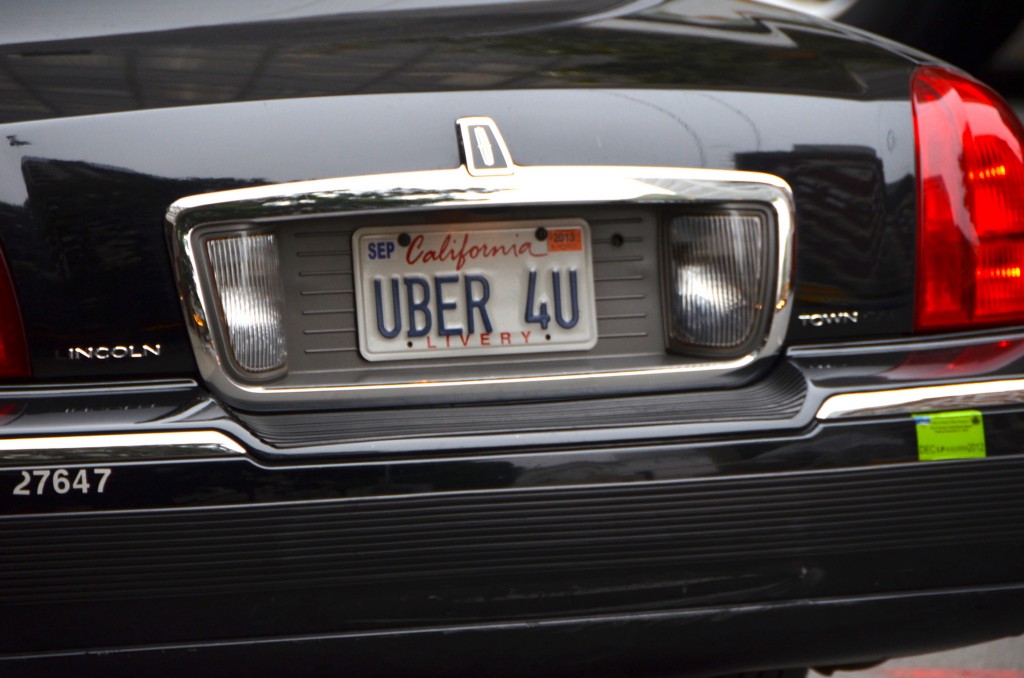Uber Forever

Numbers are boring, except when they’re not, like when Uber, a five-year-old company that has accumulated over a billion-and-a-half dollars in investment capital and is worth eighteen billion dollars, stands to raise another billion and double in value from six months ago, to between thirty-five and forty billion dollars. This, Bloomberg helpfully points out, puts Uber at “about 1.5 times the capitalization of microblogging service Twitter Inc. and at about the same size as Salesforce.com Inc., Delta Airlines Inc. and Kraft Foods Group Inc.”
Though both Uber and Delta are in the people-moving business — Delta being the world’s busiest airline, with over a hundred and twenty million passengers last year — it would seem to make more sense to put Uber in the context of cars: Bloomberg also notes that Hertz, the largest rental car company in the U.S., has a market capitalization of $11.3 billion, while the entire U.S. taxi business generates some eleven billion dollars a year.
But Uber isn’t really a car company, either; like many technology startups that operate in the physical world — the ones that don’t depend solely on advertising and attention widgets — it is most fundamentally a logistics company, one with growth potential that, to its investors, is nearly infinite, making shares in it a bargain at any price: Uber is in some hundred and thirty markets and its revenue doubles every six months (and estimates are that within a year, it will be generating ten billion dollars in revenue annually). More exemplary of that potential, maybe, is that when Uber first started in San Francisco, the size of the entire taxi and limo market was around a hundred and twenty million dollars; today, in San Francisco alone, Uber makes “several hundred million” dollars a year, according to Kalanick. (According to Henry Blodget, it is used by twenty-five percent of all smartphone users in San Francisco. As he points out, it could “eventually be much higher — perhaps fifty or seventy-five percent of smartphone users.”)
As Uber’s CEO Travis Kalanick put it to Evelyn Ruesli, “it’s about the market we’re creating.” Right now, that market is largely based on new passengers in new cities, or, more fundamentally to Uber’s business, people that have not or do not normally take cabs but now use Uber because it is more convenient and cheaper than a taxi (in New York City) or parking (Los Angeles) or drunk driving (any city except New York). The goal is not merely to “basically make car ownership a thing of the past,” as Kalanick told Ruesli, but to subvert and supplant existing parts of transit infrastructure, whether they should be disrupted (the old taxi system in San Francisco) or not (public transit). Uber, as a logistics company, efficiently matches empty cars to eager passengers. (And, occasionally, ice cream, barbecue, and Christmas trees, as “experiments.”) As Uber creates more passengers it needs a larger supply of drivers and vehicles; most of those new passengers are taking its cheapest service, UberX, which is the engine of Uber’s ubiquity. UberX relies on independent drivers using their own vehicles, insurance, and gasoline to convey passengers at their own risk, for a portion of each fare; Uber expends a great deal of energy to ensnare new drivers to meet the ceaseless demand it has created for its absurdly cheap rides, which it has made semi-sustainable with its massive warchest and by cutting drivers’ fares to keep costs low.
It is a foregone conclusion that Uber will, in short order, crush its rivals like Lyft into pulp for listicles about dead tech companies — and perhaps even regular taxis, barring steadfast government regulation. It will win. Another one of those conclusions, particularly if you are a Silicon Valley venture utopist, is that its human drivers are merely temporary drags on both Uber’s revenues and efficiency that will remedied in the coming years by self-driving cars (whose chief proponent is one of Uber’s single largest investors, Google). Algorithms require no wages at all; truly do not care if you play Beyonce songs through your Spotify account and aren’t just telling you that so you don’t give them a bad rating; and will not smash passengers in the face with a hammer. In this brave new efficient world in which all cars are connected, self-driving, electric vehicles, it makes almost no sense to personally own one unless you are laughably rich; they will all be managed, distributed, and routed by a single, vast logistics company.
Best of all for investors, personal conveyances will perhaps just one small part of a nearly infinite enterprise’s business since, from a certain point of view, the world is just one giant logistics problem. That enterprise might be Google, or Amazon, or, even better for a budding venture capitalist, one that doesn’t even exist yet. But there’s also not a terrible chance that it will be Uber. Worse bets have been made on the future.
Photo by Adam Fagen
